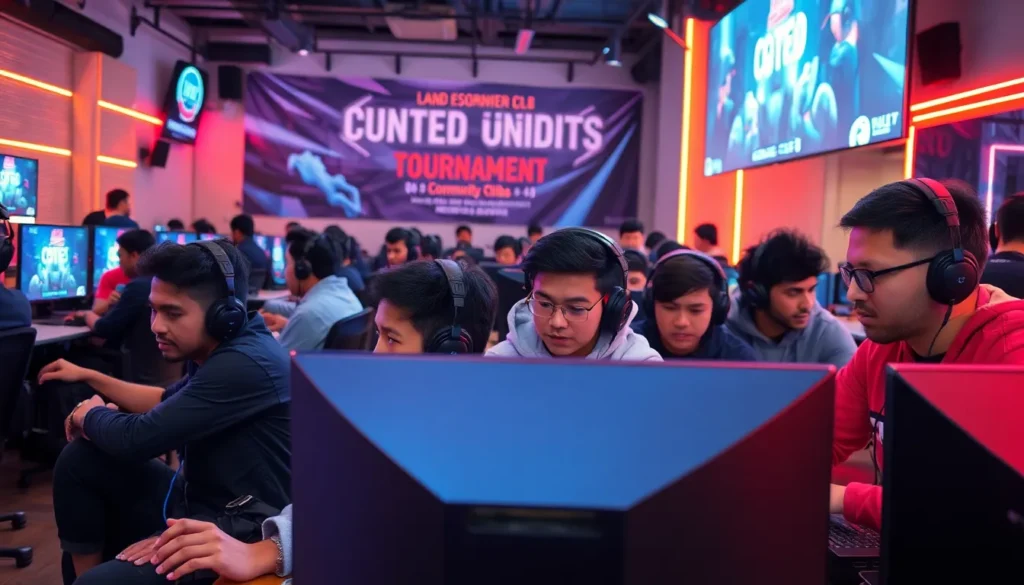Table of Contents
ToggleImagine a place where passion for gaming meets camaraderie, strategy, and intense competition. Welcome to the world of esports clubs. Heavily influenced by the explosive growth of competitive gaming, these clubs are more than just gathering spots: they’re the launching pads for aspiring gamers looking to hone their skills, build networks, and maybe one day, conquer the esports championship scene. If one thinks of traditional sports clubs, they might picture sweaty gymnasiums and the roar of a crowd. Now picture that same excitement, but with controllers in hand and digital arenas filled with titans of tech. In this text, we’ll explore everything about esports clubs, from their soaring popularity to how to establish and sustain them. Ready to jump into the battlefield? Let’s go.
Understanding Esports and Its Popularity

Esports, or electronic sports, has emerged from humble beginnings in basements and college dorms to become a global spectacle recognized by millions. This phenomenon is characterized by organized, multiplayer video game competitions, particularly between professional players or teams. From games like “League of Legends” to “Dota 2,” esports has captivated audiences both online and offline, with some events drawing crowds comparable to traditional sports finals. The rise of streaming platforms like Twitch and YouTube Gaming has only fueled this trend, allowing fans to witness live matches and interact with their favorite gamers, bringing the community closer than ever.
Also, the demographic watching esports has expanded to include a broader age range. Not just teenagers and young adults anymore, young professionals and older enthusiasts are tuning in, making it a multi-generational phenomenon. Sponsorships from big brands and partnerships with major leagues have contributed immensely to its legitimacy and allure, turning what was once considered mere gaming into a billion-dollar industry. As more people engage with esports, the push for structured organizations, like esports clubs, has surged, providing players with resources and communities that support their competitive aspirations.
The Role of Esports Clubs
Esports clubs act as hubs for dedicated gamers who share a common goal: to enhance their skills and foster a competitive spirit. But what exactly do these clubs provide that sets them apart?
Benefits of Joining an Esports Club
Joining an esports club offers numerous benefits ranging from structured training to access to experienced mentors. Members often gain insights into game mechanics, strategies, and teamwork tactics that can significantly impact their performance in competitive settings. Through regular practice sessions, members sharpen their skills while benefiting from the collective wisdom of fellow gamers.
Skill Development and Training Opportunities
Clubs often create comprehensive training programs catering to different game genres and skill levels. Whether one is a rookie struggling with basic controls or an experienced player aiming for advanced tactics, there’s a place for everyone. Workshops led by skilled players can help refine individual gameplay, focusing on specific skills like aiming or communication.
Community and Networking
Esports clubs aren’t just about competition: they cultivate a sense of community. Members forge friendships that can last beyond the gaming sessions. Networking within these clubs can lead to meaningful connections in the industry, such as game developers, sponsors, or even professional teams looking for talent.
Inclusivity in Esports Clubs
Inclusivity is a cornerstone of many esports clubs. Many of them actively promote diversity, ensuring that players from various backgrounds can come together to share their love for gaming. This commitment enriches the club’s culture and inspires a supportive environment where everyone feels valued.
How to Start an Esports Club
Starting an esports club might seem daunting, but with the right approach, it can be an exciting adventure for gaming enthusiasts. Here’s a roadmap to kick off this journey.
Setting Goals and Vision for the Club
Before diving in, it’s essential to outline the club’s vision and set achievable goals. Do members aim to compete in local tournaments, or are they here to foster a casual gaming community? Establishing a clear purpose will guide future decisions and attract like-minded individuals.
Recruitment and Membership Strategies
Recruitment plays a vital role in the club’s success. Utilizing social media platforms and community forums can be effective for outreach. Hosting gaming events or casual meet-ups might entice interested players. Word-of-mouth also works wonders, encouraging current members to invite their friends can rapidly grow the club’s size.
Organizing Events and Tournaments
Once the club is established, organizing events becomes crucial. Tournaments can energize members and draw in spectators. Even informal game nights can build connection and engagement. Ensure that games include a variety of genres so everyone has a chance to contribute toward a fun and exciting atmosphere.
Sustaining Your Esports Club
A successful club doesn’t end with recruitment: sustaining momentum is vital for longevity.
Funding and Resource Management
Sustainability often requires financial backing. Clubs can charge membership fees or seek sponsorships from local businesses. Also, exploring crowdfunding through platforms like GoFundMe can provide necessary funds while involving the community in the club’s journey. Managing resources wisely ensures that the club can afford essentials like gaming equipment and venue rentals for tournaments.
Creating Partnerships and Sponsorships
Forming partnerships with local gaming shops, internet cafes, or even larger brands opens new avenues for resources and marketing. Such collaborations can lead to sponsorship opportunities, offering financial support or prizes for tournaments, further incentivizing participation.
Monitoring Growth and Member Engagement
Keeping track of the club’s growth involves more than just numbers: it requires assessing member satisfaction. Regular feedback sessions can help identify areas needing improvement. Also, ensuring that activities align with member interests will keep engagement high.
The Future of Esports Clubs
As technology continues to advance, esports clubs are poised to embrace new trends.
Emerging Trends and Technologies
The rise of virtual reality (VR) gaming and augmented reality (AR) is reshaping the gaming landscape. Clubs that adapt to these changes will attract those eager to experience the next frontier in gaming. Also, incorporating advanced analytics tools can help players refine their gameplay using real-time data, providing a competitive edge.
The Global Impact of Esports
Esports clubs are becoming increasingly influential on a global scale. From grassroots movements fostering local talent to international clubs competing at the highest level, the reach of esports continues to expand. Such clubs may play pivotal roles in this evolution, acting as incubators for the next generation of gaming champions, who could eventually pave the way for even greater recognition of esports as a legitimate sport.








